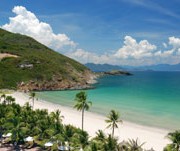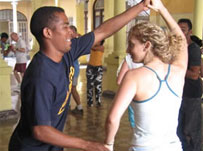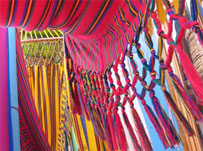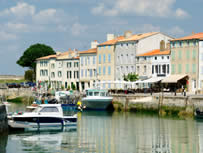Suzanne Furstner Foundation Scholarship 2010: Shortlisted Entry Number 4
Applicants who wanted to apply for the scholarship, which comprises a four-week TEFL course in San Francisco plus a language course, were asked to write a maximum of 1,000 words on the topic ‘San Francisco’, interpreted any way they choose.
The entries were assessed according to the quality of the writing, the relevance to the theme and the accuracy and variety of the language.
You can read Simon’s entry in full below.
San Francisco – A Flyway
“Only one is a wanderer. Two together are always going somewhere.”; Not an endorsement for bilingualism, but a voice reverberating around a council house living room in West Suffolk. A nine year old boy watches a woman, on a knackered eighties model television, confess her love on a San Franciscan street in Alfred Hitchock’s Vertigo. I’d been aware of San Francisco from a young age for a few reasons, in part due to my mother who was an ex-hippie, then living what she now refers to as a “conformed life” (she now resides in a mobile home in Norfolk). She’d often muse about being a little older so she could have been there in San Francisco during the Summer of Love. Then there was my Grandmother, a force of nature that would pass through our home regularly, often talking about her “women’s problems” – how she was constantly hot because the birth of my mother had forever altered her blood flow, and how ever since her menopause she’d been even hotter. A doctor had told her that the cool, sunny San Franciscan climate would be perfect for her condition, especially during the foggy summers; “No more sweat’n over noth’n” she’d say in a broad East Anglian accent. Then there was my Great Grandmother, who used to make us watch these old films in the first place, especially the detective ones. Two of her favourites – The Maltese Falcon and Vertigo both acquainted me with Golden Gate City. She’d routinely have an afternoon sherry or three, doze off and leave me and my brother in the company of Sam Spade as he chased crooks around the Bay Area. Four generations under one roof, every Sunday. Perhaps it was these early screen impressions, the white streets and cable cars, or later interests in counterculture and San Fran Beat poetry that fuelled my wanderlust for California. More likely, was that the West coast sunshine and salty air of the Pacific seemed, and still does, like the antidote to low grey skies, English cynicism and the monotony of working class life. I’m perfectly aware this is probably an invented hyperreality. I’m also conscious of the fact the grass isn’t always greener, and that the voyage to enlightenment is internal, I Ching and so forth – I don’t care, I want to fly.
My relationship with language is more experiential and personal. I was born in Puglia, Italy to a very young English mother and an Italian father. After an illicit but passionate romance between the two of them that ended with the same posthaste and irrationality with which it began, I was back in England with my mother. I saw my father sporadically, and our early time spent was tender if not rather comical. I didn’t speak Italian, as my mother refused to teach me on principle, and although a man of good nature, my father was a labourer from south Italy – languages were not his strong point. Our quiet time together was filled with physical gestures and decipherment, not dissimilar to silent-era Laurel and Hardy sketches. Although I gradually began to understand the regular questions; “Inglese mangiano questo?” (English people eat that?), “Quando viene in Italia?” (When are you coming to Italy?), and “Chi era quell’uomo a casa?” (Who was that man at your Mum’s house?) it was thanks to the later summers spent in Italy with my colossal paternal family that I learnt Italian. I remember all the phases of learning vividly, especially the early impatience and frustration of not being able to express myself coherently – particularly to my father, for whom I had so many questions. (Fret not prospective pupil, for the routine banging of one’s head in vexation upon hard surfaces is not an action this TEFL teacher is unaccustomed to.) Yet after nine years of seasonal holidays, I was finally able to confidently speak Italian. Thereafter I spent more time with the people and the Adriatic region I love. By which time ironically, the questions I had always wanted to ask my father had lost importance. Learning Italian taught me the unifying potential of language, and its ability to open up new worlds.
I was on a knee-crushing economy flight back from Puglia last summer when I was seated next to a Lecturer from the Università di Bari. We exchanged pleasantries before, seeing as I’m English, the inevitable topic of language arose. The gentleman expounded enthusiastically on the importance of French philosopher Jaques Lacan – He rhapsodised on Lacan’s theory that language was our world, how it dictated our thoughts and actions fundamentally and how the two axes of language; substation and displacement – correspond to the working of the unconscious; “It is the world of words that creates the world of things”. What I found most fascinatingwas the idea that when we have feelings or thoughts that are indescribable linguistically, it’s because we have transcended these mental barriers. When learning Italian, what struck me the most was the words and phrases that didn’t have a precise English translation – I couldn’t truly capture what I wanted to express. More interestingly, was the fact I was able to understand these expressions in Italian to begin with. So here’s my own theory; if by learning another language, one can think in another language and adopt more dimensions of expression, thereby dissolving more of these mental barriers semiotically, then one can expand the understanding of one’s own mind and one’s own reality. I find the idea of being a part of such a process by teaching a language to someone indescribable. (Pompous theorising over)
What is describable is my current situation. I’m approaching twenty-five and my feet are itching. University is over, I’m flat broke, and I’m standing at a fork in the road. So like my Nonna Lucia used to say while watching the indigenti from her balcony; “If you don’t have money in your pocket, you better have honey in your mouth.” Hopefully my words here have been sweet enough. A TEFL course could certainly make them sweeter, and provide enough nectar for those I teach to make their words sweeter still. Brazen desire and optimism maybe all I have to offer, but I am ready. Like the the Shorebirds that migrate to the Sacramento Valley and tidal marshes of San Francisco every autumn, I want to fly, if only for a month, to the City By The Bay. To quote a great San Franciscan poet;
Say it, say a new joy,
a fresh start, a new body.
Longing in the heart
too stark
to be denied!


 French in the morning and chilling out on palm-fringed beaches in the afternoon. Add to this a good dose of Caribbean and Creole culture, and winter back home will soon be a distant memory.
French in the morning and chilling out on palm-fringed beaches in the afternoon. Add to this a good dose of Caribbean and Creole culture, and winter back home will soon be a distant memory.




